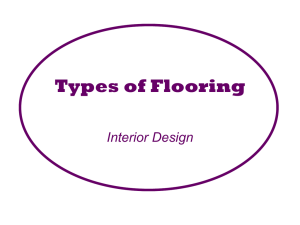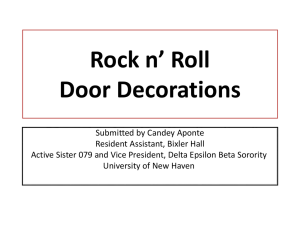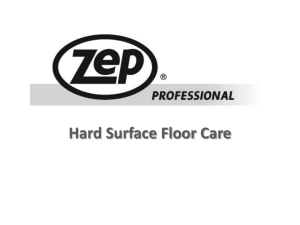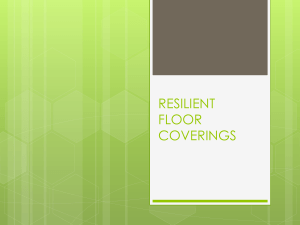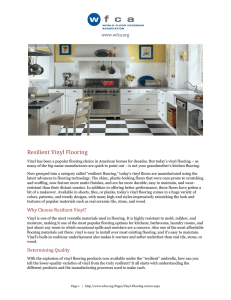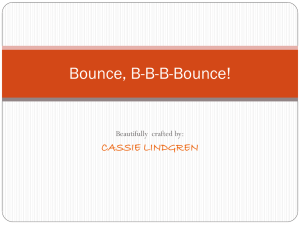Floor Materials Acceptable for Food Facilities
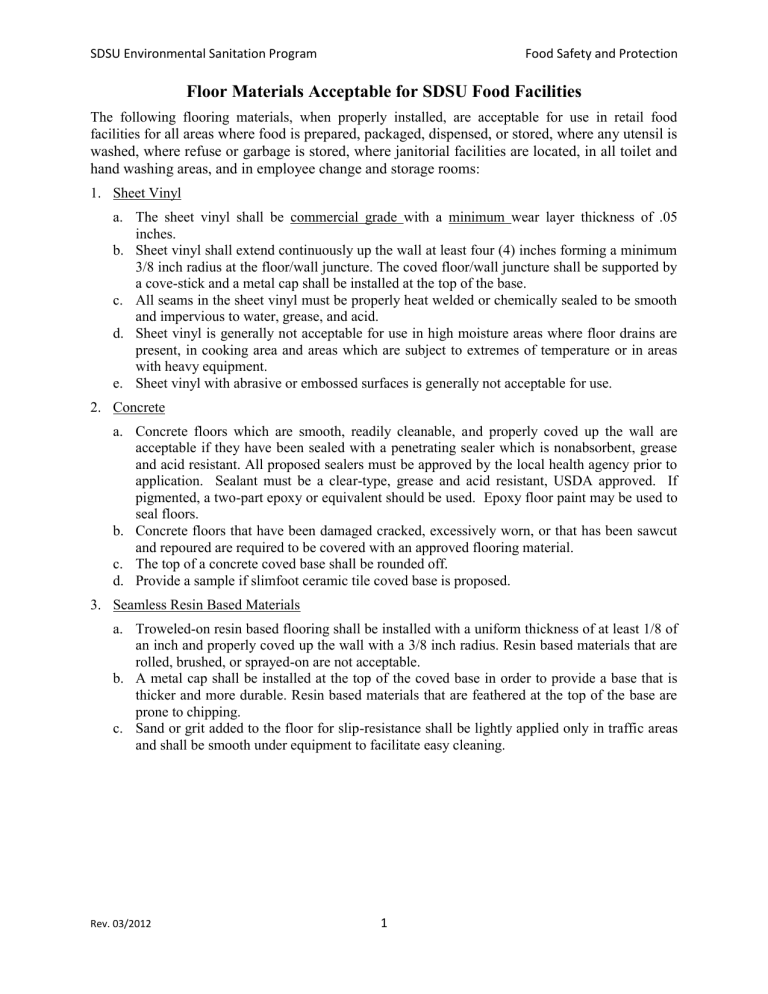
SDSU Environmental Sanitation Program Food Safety and Protection
Floor Materials Acceptable for SDSU Food Facilities
The following flooring materials, when properly installed, are acceptable for use in retail food facilities for
all areas where food is prepared, packaged, dispensed, or stored, where any utensil is washed, where refuse or garbage is stored, where janitorial facilities are located, in all toilet and hand washing areas, and in employee change and storage rooms
:
1.
Sheet Vinyl a.
The sheet vinyl shall be commercial grade with a minimum wear layer thickness of .05 inches. b.
Sheet vinyl shall extend continuously up the wall at least four (4) inches forming a minimum
3/8 inch radius at the floor/wall juncture. The coved floor/wall juncture shall be supported by a cove-stick and a metal cap shall be installed at the top of the base. c.
All seams in the sheet vinyl must be properly heat welded or chemically sealed to be smooth and impervious to water, grease, and acid. d.
Sheet vinyl is generally not acceptable for use in high moisture areas where floor drains are present, in cooking area and areas which are subject to extremes of temperature or in areas with heavy equipment. e.
Sheet vinyl with abrasive or embossed surfaces is generally not acceptable for use.
2.
Concrete a.
Concrete floors which are smooth, readily cleanable, and properly coved up the wall are acceptable if they have been sealed with a penetrating sealer which is nonabsorbent, grease and acid resistant. All proposed sealers must be approved by the local health agency prior to application. Sealant must be a clear-type, grease and acid resistant, USDA approved. If pigmented, a two-part epoxy or equivalent should be used. Epoxy floor paint may be used to seal floors. b.
Concrete floors that have been damaged cracked, excessively worn, or that has been sawcut and repoured are required to be covered with an approved flooring material. c.
The top of a concrete coved base shall be rounded off. d.
Provide a sample if slimfoot ceramic tile coved base is proposed.
3.
Seamless Resin Based Materials a.
Troweled-on resin based flooring shall be installed with a uniform thickness of at least 1/8 of an inch and properly coved up the wall with a 3/8 inch radius. Resin based materials that are rolled, brushed, or sprayed-on are not acceptable. b.
A metal cap shall be installed at the top of the coved base in order to provide a base that is thicker and more durable. Resin based materials that are feathered at the top of the base are prone to chipping. c.
Sand or grit added to the floor for slip-resistance shall be lightly applied only in traffic areas and shall be smooth under equipment to facilitate easy cleaning.
Rev. 03/2012 1
SDSU Environmental Sanitation Program Food Safety and Protection
4.
Quarry and Ceramic Tiles a.
The minimum thickness for quarry and ceramic tiles is ¼ inch. All tiles, regardless of thickness, will be evaluated on the basis of their density and porosity. b.
The tiles and grout must be sealed to be impervious to water, grease, and acid. Use anhydrous or epoxy grout in high moisture areas. c.
Non-absorbent grouting impregnated with epoxy, polyurethane or other anti-hydrolytic materials to be used in wet areas. d.
Tile with abrasive or embossed surfaces are acceptable only in traffic areas and shall be smooth under equipment. e.
The base shall be a like material keyed into the floor with a 3/8 inch radius.
5.
Alternative Flooring
Other flooring materials may be approved upon submission of samples and specifications for evaluation by the Environmental Health-Plan Check Program. Specifications and samples of alternative flooring materials must be submitted prior to installation.
Unacceptable Floor Covering Materials
The following floor covering materials are acceptable only in customer sales and dining areas:
1.
Unsealed concrete or concrete sealed with an unapproved sealer (e.g. stains or sealers which are absorbent and not grease and acid resistant).
2.
Sheet vinyl with foam backing.
3.
Vinyl composite tile (VCT).
4.
Laminated flooring materials.
5.
Wood.
6.
Carpeting.
7.
Asphalt.
False Floors
When false floors are proposed, they shall comply with all of the following requirements: a.
The raised floor shall conform to the general structural requirements as noted in this document. Check with the local building authorities for the proper spacing of joists, etc. b.
The sides of the sub-floor shall be walled-in and sealed at the main floor and wall junctures. c.
All equipment is to be installed on top of the raised floor. d.
Floor sinks, floor drains, etc., are to be installed flush with the top of the raised floor and located to be easily accessible for cleaning.
Cove Base
Cove base are at least 4 inches high with a 3/8 inch minimum radius cove as an integral unit. This extension of the floor includes toe-kicks of counters and equipment that sets flush on the floor.
At customer self-service food and beverage counters, seamless commercial grade self-coving flooring shall be provided around all open sides of the counter for a distance of at least three feet.
Rubber or vinyl topset coved base is not acceptable in food prep and service areas, self-service areas, storage rooms with open containers, and any wet areas including restrooms and janitorial closets.
This document was created using County of San Diego Department of Environmental Health Acceptable Floor Materials
Guidance Document.
Rev. 03/2012 2
